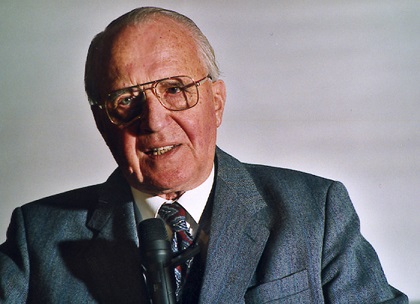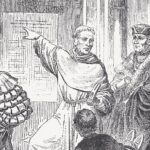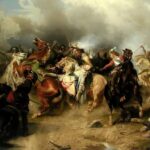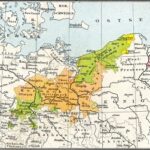November 10, 1483
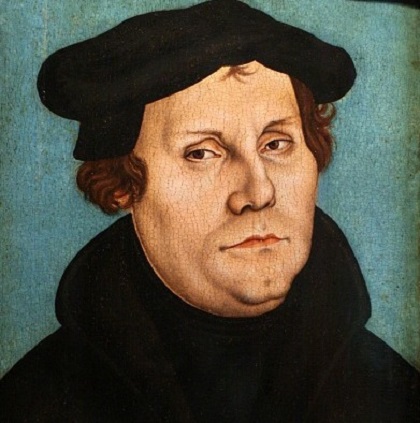 Birth of Martin Luther in Eisleben, Germany. He was a German monk, priest, professor of theology and important figure of the Protestant Reformation. He strongly disputed the claim that freedom from God’s punishment for sin could be purchased with money.
Birth of Martin Luther in Eisleben, Germany. He was a German monk, priest, professor of theology and important figure of the Protestant Reformation. He strongly disputed the claim that freedom from God’s punishment for sin could be purchased with money.
November 10, 1683
Birth of George II in Hannover. He was the son of George I who had become the King of England. George II would follow his father as Elector of Hannover (Holy Roman Empire) and King of England. George II was born in Hannover, Germany like his father and grew up on the Continent. Unlike his father, he learned English before he became king. A lover of music, he was the patron of George Friedrich Händel, whom he brought to London. He was succeeded by his grandson, George III, who fought to retain the American colonies.
November 10, 1759
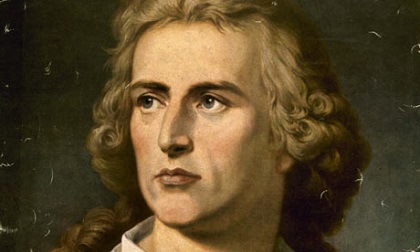 Birth of Friedrich Schiller in Marbach, Germany. Schiller was one of the greatest German writers of all times. His writing started in the “Sturm und Drang” style and developed into the Classical style. Works by Schiller include, Die Räuber, Wallenstein (a series of three plays), Maria Stuart, Don Carlos, and Wilhelm Tell. A poem which he wrote, An die Freude, became an immortal classic through its use as the text to the final movement of Beethoven’s Ninth Symphony. Schiller was a close friend of Johann Wolfgang von Goethe and worked with him in Weimar.
Birth of Friedrich Schiller in Marbach, Germany. Schiller was one of the greatest German writers of all times. His writing started in the “Sturm und Drang” style and developed into the Classical style. Works by Schiller include, Die Räuber, Wallenstein (a series of three plays), Maria Stuart, Don Carlos, and Wilhelm Tell. A poem which he wrote, An die Freude, became an immortal classic through its use as the text to the final movement of Beethoven’s Ninth Symphony. Schiller was a close friend of Johann Wolfgang von Goethe and worked with him in Weimar.
November 10, 1874
Birth of Gustav Georg Embden in Hamburg, Germany. Embden was a chemist who was the first to describe the whole of the process of the conversion of glycogen to lactic acid. He was a professor at the University of Frankfurt and served that university as Rektor.
November 10, 1887
Publication of Friedrich Nietzsche‘s Genealogie der Moral.
November 10, 1887
Birth of Arnold Zweig in Glogau, Germany (now in Poland). Zweig was a writer whose works include Junge Frau von 1914 (1931), Erziehung vor Verdun (1935) and Der Streit um den Sergeanten Grischa (1927).
November 10, 1918
Birth of Ernst Otto Fischer in Munich, Germany. Fischer, a theoretical chemist, won the Nobel Prize for Chemistry in 1973 for his work leading to knowledge as to how metals and organic compounds can merge. He has been a professor at the Universities of Munich, Jena and Marburg.
November 9-10, 1938
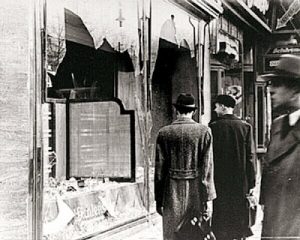
Kristallnacht or Reichskristallnacht, also referred to as the Night of Broken Glass, Reichspogromnacht or simply Pogromnacht, and Novemberpogrome, was a pogrom against Jews throughout Nazi Germany on 9–10 November 1938, carried out by SA paramilitary forces and German civilians. Over 250 synagogues are desecrated, over 7,000 shops are destroyed, 91 Jews are murdered, 20,000 persons are arrested. The cynical term “Kristallnacht” refers to the shop windows which were broken.
November 10, 1948
Death of Julius Curtius in Heidelberg, Germany. Curtius, a member of the Deutsche Volkspartei became economics minister of the Weimar Republic in 1926. In 1929 he became the foreign minister. He resigned after his attempts to form a customs union between Germany and Austria were severely criticized by the international community.
November 10, 1989
Approximately 600,000 East Germans come to West Berlin.
